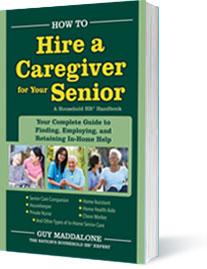Guide to Senior Care Taxes and Payroll
They took care of you – now you want to care for them.
Hiring the right in-home senior caregiver for a spouse or elderly parent means that your loved one can continue to live at home (sometimes called “aging in place”) in an active, safe, and supported environment. You’ll also take on the responsibilities of a household employer including payroll, tax, insurance, and compliance obligations. Being an employer also gives you more flexibility and options on who you hire and control of the caregiver’s duties.
GTM Payroll’s services feature our professional expertise in senior care taxes and payroll processing, compliance, and workers’ compensation coverage and come with ongoing, unparalleled client service and support. We’ll manage it all for you. That’s senior care taxes and payroll without the risks, hassles, and worries of doing it yourself or ignoring your responsibilities.
Determining if You’re A Household Employer
You’re likely a household employer and have senior care tax and payroll responsibilities if you employ any of the following workers either full- or part-time:
- Eldercare companion
- Home assistant
- Adult daycare provider
- Home health aide
- Combination roles, such as a housekeeper/home health aide.
There are three ways to hire a senior caregiver:
- Using a home health care agency
- Through a referral or placement agency
- Independently
Home Health Care Agency
A home health care agency will employ the caregiver. As the employer, the agency will select the caregiver to work in your senior’s home, control their job duties, and manage payroll and taxes. You have fewer responsibilities but less control. For example, you may not get the same caregiver every time.
Referral or Placement Agency
When you work with a referral or placement agency, you’ll pay a fee, and they’ll help you find a senior caregiver that matches your needs. Once the employee is placed, you are responsible for payroll, taxes, insurance, and compliance. This is similar to hiring a nanny through a nanny agency.
Independently
By managing the hiring process on your own, you’ll find, recruit, and hire a senior caregiver without the help of an agency. You’ll be the employer and must manage payroll, taxes, insurance, and compliance. You’ll also have more control over the employment and the caregiver’s job responsibilities.
Independent Contractor or Employee: Classifying Your Senior Caregiver
Federal law dictates that household workers like in-home senior caregivers are employees, not independent contractors. You define the work that needs to be done and control how tasks are accomplished. Nearly all of the time, the IRS classifies an in-home senior caregiver as an employee. They should have FICA taxes (Social Security and Medicare) withheld from their pay and receive a W-2 at the end of the year, while you, as the employer, will contribute your share of FICA taxes and pay unemployment taxes. You may also need workers’ compensation insurance. Learn more about employee classification.
Senior Care Tax Responsibility
If you pay cash wages of $2,800 or more to an in-home senior caregiver in 2025 (or $2,700 in 2024), you must withhold and pay FICA taxes. Your employee’s share is 7.65 percent, and you will owe the same amount for a total of 15.3 percent. If you pay an in-home senior caregiver $1,000 or more in any calendar quarter, you must pay federal unemployment taxes. This tax is six percent of cash wages on the first $7,000 in wages but can be reduced significantly to just 0.6 percent based on your contributions to state unemployment. Learn more about senior care taxes.
Workers’ Compensation Requirements
You may be required to carry workers’ compensation. The laws around coverage are different for each state. Review specific workers’ compensation requirements by state.
Even in states where a policy isn’t required, voluntary coverage may be a good idea. It gives you and your employee peace of mind in the event of an accident or illness. Your employee gets immediate financial support to help with medical bills and lost pay while you’re protected financially. In some states, a policy may only cost a few hundred dollars a year.
Non-compliance with your state’s workers’ compensation requirements can be one of the biggest financial mistakes you can make as a household employer. A single work-related accident could leave you liable for tens of thousands of dollars in medical bills, lost wages, and state fines. In New York State, for example, you could face a fine of up to $2,000 for every 10 days of noncompliance. Additionally, the fine for a criminal conviction is from $1,000 to $50,000.
Never assume your employee’s work-related injury or illness is covered under your homeowner’s insurance policy. Only in a couple of states (California and New Jersey) can you add workers’ compensation coverage to your homeowner’s policy.
Sleeping Time Laws
If you ask your senior caregiver to work overnights or long shifts or hire a live-in employee, you must follow federal sleeping time laws set by the Fair Labor Standards Act (FLSA).
Caregiver is on duty for less than 24 hours
If your caregiver works an overnight shift and their charge goes to bed at some point, your caregiver may be allowed to sleep as well if their duties are completed and knowing that they must awake to respond to any of the senior’s needs. Even though they are sleeping, your caregiver remains on duty to perform work. That means they are paid for all hours on the job, including those when they may be allowed to sleep. Overtime pay still applies to hours worked over 40 in a week.
Caregiver is on duty for 24 or more hours
If your caregiver has a shift of 24 hours or more, sleeping time and meal periods must be paid. Your caregiver could agree to exclude sleeping time and meal periods from time worked if you provide adequate sleeping facilities, and they can get at least eight hours of uninterrupted sleep.
If your caregiver’s sleep time is interrupted to perform work and, as a result, they get five or fewer hours of sleep, you must count all time as hours worked, including hours the employee slept. If your caregiver performs work during their sleeping time but still gets more than five hours of sleep, you need to pay only for the time the caregiver worked.
Caregiver resides on premises
If you hire a live-in caregiver, you’re typically not required to pay them for sleeping time. Your caregiver is considered to have adequate time for personal activities and can even leave the premises for personal reasons.
State laws
Some states may have their own requirements for compensating employees for sleeping time. You’ll need to comply with the state or federal provisions that are more favorable to your caregiver. For example, New York’s 13-Hour Rule states that a household employee asked to work a 24-hour shift will only need to be paid for 13 hours as long as the caregiver is provided eight hours for sleep and three hours for meal breaks. Check with your state’s labor department for any sleeping time laws that may impact your senior caregiver’s employment.
Companionship Care Overtime Exemption
Senior caregivers who meet the companionship care exemption are exempt from overtime rules. Companionship care is defined as “fellowship and protection” for a person who cannot care for themselves because of advanced age or infirmity. Overtime requirements don’t apply if care meets this companionship care definition. For the exemption to apply, less than 20 percent of a senior caregiver’s time can be spent on activities like bathing, dressing, preparing meals, driving to appointments, housekeeping, and other duties necessary to care for an elderly patient. The exemption doesn’t apply to caregivers hired through a third party like a home health care agency.
Choosing a Senior Care Tax and Payroll Provider
A payroll service can help remove the risks, hassles, and worries of getting senior care taxes and payroll right. It can also save you time, make payday easy for you and your elderly loved one, and reduce the chances of fines and penalties for non-compliance. However, not all senior care tax and payroll providers are created equally. You’ll want one specializing in household payroll, can support the nuances of senior care, and will provide unlimited support from a team of experts. Before deciding on a payroll service, check out our 7 Questions to Ask Before Choosing a Tax & Payroll Provider.
GTM Makes Senior Care Taxes and Payroll Easy
Let us simplify your life with a complete solution for all your senior care payroll needs. One call to GTM takes care of it all:
- Comprehensive payroll services including all deductions and withholdings. Free direct deposit makes payday safe and easy. Make any adjustments online at your convenience.
- 100% guaranteed on-time, every-time tax filings. If you receive a notice from the IRS, or any other tax agency, based on a filing that GTM Payroll Services made, we’ll work with the agency on your behalf to resolve the issue. If we’re at fault, we’ll pay all the associated penalties and fines.
- Compliance with tax, wage, and labor laws. Our team of household employment experts will help you stay legal to avoid fines and penalties and protect your family and employees.
- In-house workers’ compensation insurance. If you need coverage, we have you covered with obtaining quotes, implementing coverage, and managing audits and invoices.
- Employee benefits. Attract and retain your best caregivers with employee benefits like health care coverage, retirement plans, and more.
Watch Our Video: Your Household Payroll and Taxes Made Easy
Download Free Chapters
How to Hire a Senior Caregiver
Download: EasyPay for
In-Home Senior Care
Questions? Get Help with Household Payroll
A household payroll expert can answer questions you have about your own situation.
Call or chat with us during business hours, or schedule a free consultation at your convenience.

Call Toll Free: 800-929-9213
Hours: Mon-Fri 8:30 am - 8pm, ET






 Get your free:
Get your free: